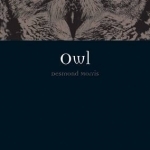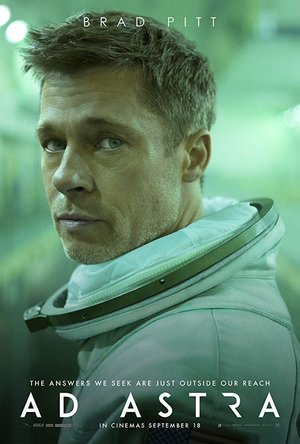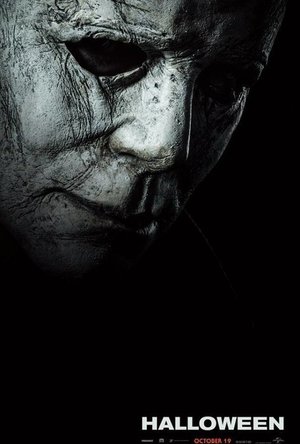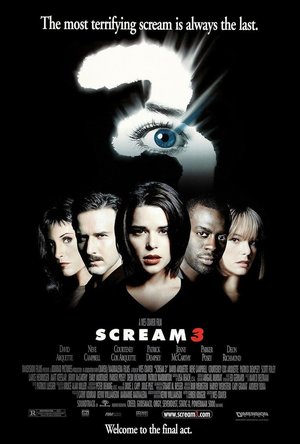LeftSideCut (3776 KP) rated Everything Everywhere All At Once (2022) in Movies
May 11, 2022
The narrative is part family drama, and part mind bending sci-fi. The family drama is well crafted and effortless to become invested in. It's gives the characters room to breathe whilst simultaneously wasting little time before shit goes off the rails. When I say mind bending, that's exactly what it sounds like. The sci-fi element is just bonkers. The alternative universes that are shown off are memorable and colourful, and the action set pieces are joyous to behold. There's some solid martial arts on display, and multiple scenarios where you can safely say "well I've never seen that in a film before".
Towering above all of the batshit insane fun however, is the very human centre that EEAAO carries with it. The last 40 minutes or so get unashamedly existential, and accurately convey the feeling of how easy it is to feel like a failure, or to feel alone and unheard in a bustling universe. It's hard hitting but is wholesome as hell (never thought a silent and subtitled conversation between two rocks would hit me in the feels but here we are)
Michelle Yeoh is wonderful and delivers a career best performance. Stephanie Hsu is also great and it's bloody lovely to see Ke Huy Quan back with a vengeance. Jamie Lee Curtis remains easy to love, even as a pain in the arse, pro wrestling tax auditer.
The Daniels have delivered and then some in their follow up effort to the equally weird Swiss Army Man and truly deserve all the praise coming their way.
Everything Everywhere All at Once is a phenomenal experience. I can't imagine anything will beat it for my personal best film of 2022. It's a bonafide, head fucking masterpiece.
Bob Mann (459 KP) rated Ad Astra (2019) in Movies
Sep 28, 2021
I really love sci-fi films with high ambitions. “Psychological” sci-fi like “Solaris” for example. And “Arrival” topped my movie list for 2016. In similar vein, “Ad Astra” is also a movie concerning attempted contact with alien life. So I had high hopes for it. But would this Sci-fi epic ultimately challenge my brain again, or end up in the “Crystal Skull” sin bin with a dodgy alien meeting?
The Plot
Set a few years into the future, Roy McBride (Brad Pitt) is the son of a legend. H. Clifford McBride (Tommy Lee Jones) was a space exploration pioneer. His picture hangs in the NASA hall of fame next to Buzz Aldrin’s. McBride senior went missing presumed dead near Neptune during a mission. The mission was to get outside the Sun’s heliosphere to scan for potential alien transmissions from nearby solar systems.
But something went badly wrong, and now the earth (and potentially all human life migrating into the solar system) is at risk from massive electromagnetic bursts arising from Neptune. Is Clifford alive and involved in the emerging crisis? The authorities send Roy on a secret mission to Mars to try to communicate with his father.
Majestic cinematography
Let’s start with a real positive. The cinematography here is first rate. Hoyte Van-Hoytema – well known for “Interstellar“, “Spectre” and “Dunkirk” – knocks this out of the park. In the same manner as “Blade Runner 2049“, many of the frames of this film could be blown up and placed on art gallery walls around the world.
Add to that some cracking film editing from John Axelrad and Lee Haugen, and some beautiful sound design and I predict the movie should feature strongly in the technical awards at the Oscars.
But “science fiction” has the word “science” in it….
I’d like to park my physics brain sometimes when I go to the movies, but I just can’t. So I really need sci-fi films to live up to the science part of their name. There are a number of areas, particularly at the back end of the film, when credibility goes out the window.
I can’t really say more here without giving spoilers, so I will leave them to a “Spoiler section” below the trailer…. don’t read this if you haven’t seen the film!
What IS this movie trying to be?
In my view the film is pretty schizophrenic in nature. This is what confused me about the trailer, jumping from a cerebral sci-fi vibe to moon buggy shoot-outs.
On one hand, its the standard (but always interesting) tale of a child abandoned by a hero-father and his attempts to reconcile what that’s done to his life and relationships. How can he ever square that circle without contacting his dad? As the film’s tag-line goes “The answers we seek are just outside our reach”.
On the other there are episodes of action that would fit happily into an action scene from Star Trek.
The two elements never really gel, leading to the feeling of the film having been written as a set of disconnected pages and the writers then saying “Hey, Jimmy, once you’ve finished making us the tea, could you just write a few lines to join those pages up into a shooting script?”. Then later, “What do you mean Jimmy you used BOTH piles of paper?!”.
The greatest sin of all
Unfortunately, the film commits a cardinal sin in my book. Those of you who follow my blog regularly might know what I’m going to say….
Voiceovers! I BLOODY HATE THEM!! It’s at the very extreme of what the great Mark Kermode calls “show don’t tell”.
Here, we don’t just have a little Brad Pitt set-up intro and he then shuts up. He just drones on and on and on with his inner thoughts. At least Matt Damon in “The Martian” got away with it by cleverly filming his video blog. And it’s not as if there isn’t a prime opportunity to use that device here! He is constantly having to talk to a computer to do his regular psychological tests! But that option is not picked up.
BIG BLACK MARK!
But the film has its moments
Bubbling under all of this are some stand-out moments where, for me, the film soared. One of them (ultimately setting me up for as much of a disappointing fall as some of the characters!) is the stunning opening shots aboard the “Sky Antenna” structure. Impressive and exciting, with falling bits of metal playing Russian Roulette with Roy’s iife.
Another strength for me is Brad Pitt. I’ve seen wildly differing views on this, but for me its a quiet but strong acting performance. There are many scenes when he has no lines, his inner (and our outer) voice gives it a miss, and he acts the socks off his peers. What with “Once Upon A Time… In Hollywood” its been a really good year for Pitt. I suspect “Hollywood” might be the one though that gets him his fourth acting Oscar nomination.
For a 2019 film, it’s actually a very male-heavy film, made more so by Pitt’s love-interest (Liv Tyler) being given virtually nothing to do other that look a bit sulky from a distance. I’m not even sure she gets a single line in the whole film! (“Miss Tyler – please sign for your script”. “But, there’s nothing in the envelope?”. “Quite Miss Tyler, Quite”).
The only decent female role goes to Ruth Negga as the Mars colony leader. Even then, she only has limited screen time and although having the title “Mars CEO” really doesn’t seem to have much power.
Elsewhere, its great to see both Tommy Lee Jones and Donald Sutherland back on the big screen again.
Final Thoughts
As any veteran RAF person will know, “Ad Astra” is Latin for “To the stars”. In space terms this is less “to the stars” and more “just beyond your front door”.
James Gray‘s film undoubtedly has high ambitions but, through its spasmodic script, never really gets there. It has the beauty of “Gravity” but none of the refinement; there’s an essence of “Space Odyssey” in places, but it never goes for the mystical angle; it has the potential to reflect the near-insanity through loneliness of “Silent Running” but never commits fully to that storyline. But if its novelty you’re looking for, it ticks the “floating monkeys in space” box!
I think it’s worth seeing on the big screen just for its visual beauty and Pitt’s performance. And as a major block-buster sci-fi film I enjoyed it to a degree. But for me it had just so many irritations that it failed to live up to my high expectations. A great shame and a frustrating disappointment.
But at least it’s great news for Richard Branson and Virgin Atlantic shareholders. They can be assured that the future is bright for their “long distance” flights in the future!

Owl
Book
The owls are not what they seem. From ancient Babylon to Edward Lear's The Owl and the Pussycat and...

The Lost Causes of Bleak Creek
Rhett McLaughlin and Link Neal
Book
It's 1992 in Bleak Creek, North Carolina- - - a sleepy little place with all the trappings of an...
Gareth von Kallenbach (980 KP) rated V for Vendetta (2005) in Movies
Aug 14, 2019
The masked figure quickly dispatches the assailants and offers to escort Evey to safety. Despite being scared, Evey does accompany the figure to a rooftop where she is treated to a spectacular explosion set to music.
Thus begins V for Vendetta a film that mixes “The Phantom of the Opera” “Beauty and the Beast” and ?” to create a gothic love story and biting social commentary about the dangers of governmental control and censorship in a society gone awry.
In London of the near future, it is learned that a series of terrorist attacks have left thousands dead which resulted in stricter governmental controls and intrusions into privacy and lifestyles. Those who did not conform nor meet expectations often vanished never to be heard from again. Such was the case of Evey’s parents who decided to protest governmental policies and soon found themselves beaten and whisked away in the night.
Behind all of the oppression is a man named Adam Sutler (John Hurt), a monomaniacal leader who rules with an iron fist and an extreme agenda that he has manipulated to make himself and unopposed ruler of the nation.
While most of the population lives in fear of Sutler and his men, there is one who does not, a mysterious masked figure named V (Hugo Weaving), who dons a Guy Fawkes mask in tribute to the man who centuries ago attempted to destroy Parliament. When V is able to temporarily gain control of the television network for the government, he is able to broadcast his message to the people that the time has come to take back their lives and society and stop living in fear. Towards this end, V pledges to the masses that he will destroy Parliament in 1 year and that the people should gather to watch the destruction unfold.
This bold proclamation causes Sutler to stop at nothing to capture V and he tasks his Chief Inspector Finch (Stephen Rea), to locate V. Since Evey worked at the television station and was observed helping V on a security monitor, Finch decides to locate Evey and force her to reveal the locale of the mysterious vigilante.
This task proves difficult as V has taken Evey into his protection and forces her to live in his luxurious yet secluded home in order to avoid the police forces.
It is during this time that Evey learns that V is a study in contrast. On one hand he is a very sophisticated person with a taste for the arts, culture, and a desire to see people free to live their lives as they desire.
During this time V also kills top members of the political party and with the discovery of each new victim, he becomes an even bigger target of a very irate Sutler.
All of which culminates in a race against the clock for V to complete his plan and exact his revenge for past wrongdoings done to him which propels the film to its climatic finale.
While the film is an interesting and at times enjoyable film it is hampered in some ways by a marketing program where early trailers showed the film to be an action filled romp. The truth is there is about 15-20 minutes of action in the films nearly 2hr and 10 minute run time which allows the majority of the film to be spent on the interaction between V and Evey.
While this is interesting and does bring in elements of “Phantom” and “Beauty” as I mentioned earlier, it is at the sacrifice of what I think are important factors. For example we learn a bit about why V is on his vendetta but serious questions from that are not answered. We do not learn the full what, where and why, on his situation. I am trying hard to avoid spoilers here so suffice it to say there are some very important questions about what was done to him, how he survived and so on that need to be answered but are not.
The action sequences though few and far between are well staged and Weaving and Portman have a great chemistry with one another and do make interesting and compelling characters.
The main strength of the film is the message that people need to be aware of what is going on around them and not be so willing to accept everything they are told at face value. There is a real sense of counter-culture with the film as the prevalent theme of question and if needed defy authority permeates the film.
The script written by the Wachowski brothers of The Matrix trilogy fame has chosen to tone down the gimmicky of bullet time effects and instead focus on a character driven drama with a message and it is one that resounds loudly and clearly.
Lucy Buglass (45 KP) rated Halloween (2018) in Movies
Jun 20, 2019
40 years after John Carpenter’s iconic horror film, we are greeted with a brand new instalment in Michael Myers’ saga. It feels like a really special moment for horror fans, as we reflect on the original decades later. The opening credits pay homage to the 1978 and provide some nostalgia for long time fans by using the same text and soundtrack that audiences would’ve seen on the big screen back then. This was a great stylistic choice as it really gets you feeling pumped for what’s to come.
The film opens with Myers in a high security facility, where two true crime podcasters attempt to communicate with him in order to learn more about him and the murders he committed. Unsurprisingly, Michael refuses to say anything, providing a seriously uncomfortable moment for the audience. Throughout the film, we don’t see or hear him, and shots of him without the mask are always the back of his head. I would have been very disappointed if they’d decided to show his face throughout, as this sense of facelessness is something that’s always scared me about him. He’s a silent killer, never jumping out and screaming, but hiding in the shadows waiting to strike at any point. Most interactions with Myers are tense, uncomfortable and nail biting. His presence alone has that effect on you.
As ever, it was a joy to see Jamie Lee Curtis reprise her role as original Myers’ victim, Laurie Strode. Throughout the film, Strode’s paranoia is hard to brush off, and actually makes you feel more on edge. It was great seeing how she’d aged, yet refused to move on, and Curtis really brought her to life once again. She was the highlight of the film for me, as she was far from a cowering victim, and someone who wanted Myers dead for good. Having said that, you can tell how much she still fears him and how she’s suffering with long-term PTSD after almost being murdered. Let’s face it, anyone would feel the same way.
Unfortunately, I did find some of the acting a bit cringeworthy and it took away from the overall experience. I know that horror films have a bit of a reputation for terrible acting and dialogue, but I felt like such an important franchise deserved better than that. In my screening there were a few laugh out loud moments, and I don’t think all of them were intentional. One thing I will say is that child actor Jibrail Nantambu is one to watch because he was such a character and brought some genuine humour to the scenes he was in. I hope he goes far. Michael’s handler Dr. Ranbir Sartain is also an interesting character that I won’t say much about, but his development throughout is particularly great.
Admittedly I would’ve preferred less focus on teenagers, families and their dramas, and more on Michael and the actual kills. The film was meant to be about him and Laurie, after all. Whilst I was mostly satisfied by the brutality and some really gruesome moments, I felt it had been hyped up to the point where I expected more. Is that bad? Have I just become desensitised to bloody moments? I’m not quite sure. Having said that, one scene in particular did have me on the edge of my seat so it was still able to provide that adrenaline rush despite all its flaws. I’m still really bloody scared of Michael Myers.
Overall, Halloween is certainly watchable and a great visit to the cinema, especially this evening. Whilst I’m not the world’s biggest Halloween fan and there are certain films in the franchise I haven’t even seen, I still enjoyed this and understood what was going on. If you’re a big horror fan, particularly of the classics, give this a go. It might give you some welcome nostalgia and scares, and maybe that’s enough.
https://lucygoestohollywood.com/2018/10/31/halloween-2018-michaels-back-back-again/

Sleep Songs
Medical and Music
App
Sleep Songs offers 12 STUDIO QUALITY, lossless instrumental song tracks to put you in a relaxed...
American Modern: Hopper to O'Keefe
Book
American Modern presents a fresh look at The Museum of Modern Arts holdings of American art made...

100 Shakespeare Films
Book
From Oscar-winning British classics to Hollywood musicals and Westerns, from Soviet epics to...
LeftSideCut (3776 KP) rated Scream 3 (2000) in Movies
Nov 7, 2020 (Updated Nov 7, 2020)
Scream is known for being a meta commentary on the general ins and outs of the horror genre, but I would argue that it goes a little overboard this time around. A big part of the plot revolves around a huge retcon, changing the established backstory set up in the first movie. Cue a somewhat forced cameo from fan favourite character Randy to explain the rules of a trilogy to the surviving leads (and poke fun at this plot development) but it fails to distract from the fact that this narrative is a complete mess.
The killers motives and patterns are unclear and constantly change, and the eventual twist and identify reveal of this movies Ghostface is hugely underwhelming, and is just re treading ground that has already been explored in the previous Scream films. Also, that voice changing plot device is just dumb.
In response to the public outcry of media violence following the Columbine shootings, there is a lot less gore this time around which also hurts the overall experience. It loses its shock factor that was particularly prevalent in the original, and gives the film a sort of blunt edge, and instead focuses on the hit and miss comedy aspect.
All this being said, Scream 3 is still enjoyable when it needs to be. The returning trio of Neve Campbell, Courtney Cox, and David Arquette is essential to that particular element. These characters have been fleshed out well over these movies, and seeing them together on screen is always a treat. Everyone else is largely forgettable, but the film manages to shoehorn in cameos from Jay and Silent Bob, and Carrie Fisher, which just adds to surrealism of it all.
Not Wes Craven's finest hour by a long shot, but still an enjoyable enough slasher, and still a part of a hugely important horror series.





